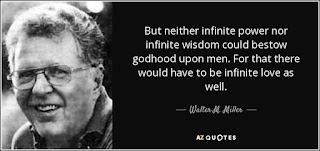My
laughter when I first read the opening scene of A
Canticle for Leibowitz
was of the near-maniacal kind that might accompany an epiphany. I was
in the Army at the time, stationed in Germany during the Cold War.
Madness hummed always somewhere in the air. We drank. Our humor
tended toward the cruelly ironic. A particularly irreverent friend
had recommended Canticle
as a particularly funny book.
I
was already primed to appreciate the ghastly irony of the second
scene that made me laugh, the one where we learn of the sacred relic,
the scrap of paper containing a grocery list in the handwriting of
the now St. Leibowitz, found in ruins by survivors of a nuclear
holocaust. My outburst at this revelation was less raucous than the
first.
By
now Walter M. Miller Jr.'s drollery had completely captivated me. His
writing at the very start--the dot on the horizon that wriggles in
the shimmering heat waves as it grows, drawing relentlessly
nearer--was the snare that closed around my ankle and tugged me
through a narrative so complex and esoteric that without its
unceasing crafty brilliance I'd surely have broken free and fled in
utter befuddlement.
Our
small post library contained nothing else by Miller. I'd made no
effort over the subsequent decades to find more of his writings,
although I've raved about Canticle
to anyone who listened. Along the way I accepted from some forgotten
source the notion Canticle
was the extent of Miller's literary production before he eventually
committed suicide.
I
carried this mysterious misinformation around until last week. In the
meantime I read Canticle again, nudged by Walker Percy's opinion it
was one of the two most important novels of the twentieth century
(the other being A
Confederacy of Dunces).
My reaction to the second reading was more profound. The
previous barks of astonishment gave way to quiet marveling—at Miller's genius, at how much I
had missed the first time around, and at how much would continue to
surprise and delight me no matter how many times I might read it.
I
learned last week from the miracle of Wikipedia A
Canticle for Leibowitz
was stitched together into a novel from three short stories. I
learned that Walter M. Miller Jr. had published more than three dozen
stories from 1950-57, including the three that became Canticle,
and that he wrote a sequel to Canticle—St.
Leibowitz and the Wild Horse Woman—finished
by science fiction author Terry Bisson from a “reportedly very
polished, manuscript” Miller left when, at age 72, within months
after his wife's death in 1995, he ended his own life.
St.
Leibowitz and the Wild Horse Woman was
published in 1997 to less than critical acclaim. I'm more interested
at the moment in reading the stories published while he was alive.
I've read two thus far in the collection Classic
Science Fiction.
I've never been a science fiction buff, but I much enjoyed both Check
and Checkmate
and Death
of a Spaceman.
Part of Miller's appeal for me is that the science does not distract
from the story, a problem I've had with other writers. And there's
the humor, which with his adroit craftsmanship and eye for the
offbeat feels ever poised to spring.
Miller's
writing arouses in me the kind of glee I get from Don Martin's
cartoons. There's a gentle recognition of the absurd and of human
frailty that many writers tend to handle more heavily. We're going to
hell in a bucket, Miller and Martin seem to say (to borrow from the
great Garcia), but at least we're enjoying the ride.
[for more Friday's Forgotten Books see the listing on Patti Abbott's unforgettable blog]




I had no idea there was a sequel too - thansk for that Matt, very curious now.
ReplyDeleteSergio, the "customer reviews" on Amazon are not kind. Evidently the sequel doesn't quite work like Canticle.
ReplyDeleteI've heard of this novel, but have never read it. Now your review makes me want to rectify the oversight. I love to laugh out loud while I'm reading unless I'm out in public and that's only because people might stare. :) Ah, what the heck, let them.
ReplyDeleteI'm of the same insouciance, Yvette.
Delete